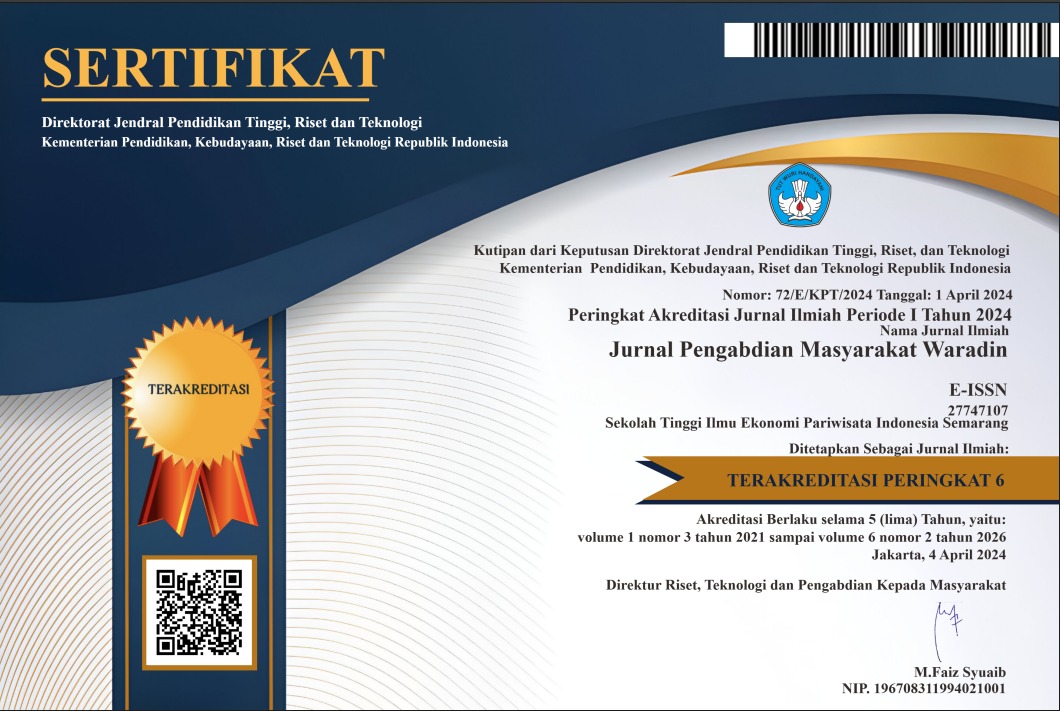Peningkatan Kemandirian Keuangan Kelompok Wanita Tani Melalui Pendekatan Berjejaring di Daerah Sudiang Makassar
DOI:
https://doi.org/10.56910/wrd.v5i2.750Keywords:
Empowerment, Financial independence, Financial Literacy, Institutional Network, Women Farmers GroupAbstract
This community service activity aims to increase the financial independence of the Women Farmers Group (KWT) in Sudiang, Makassar, through a networking approach and strengthening financial literacy capacity. The main problems faced by the local KWT are the still low understanding of group financial management, limited access to financial information, and dependence on external assistance. Through socialization, training, and interactive discussions, participants were provided with an understanding of the basic concepts of financial independence, simple financial record keeping, collective fund management, and the importance of institutional networks as a sustainability strategy. The results of the activity showed an increase in members' understanding of the importance of financial literacy and the ability to design an internal financial system independently. In addition, strengthening networks with local stakeholders was also started as a first step towards finding a KWT business. The activity concluded with a question and answer session and the presentation of certificates to participants as a form of appreciation and ongoing motivation. Going forward, further mentoring is needed so that the empowerment process can continue to develop consistently. As a follow-up to this activity, a sustainable mentoring strategy is needed so that the understanding and skills that have been acquired do not just stop at the level of knowledge, but can be implemented in real life in the KWT's daily activities. This mentoring can include monitoring the group's financial records, facilitating access to microfinance institutions, and training in building partnerships with external parties such as government, academics, and the private sector. With structured mentoring, KWT is expected to be able to build a transparent and accountable financial management system and support the growth of sustainable, productive businesses. This aligns with efforts to strengthen women's independence in the agricultural sector while contributing to the welfare of families and the wider community.
References
Darto, D., Husainah, N., Hendrawati, T. Y., Sabilla, Z., & Mudjianto, A. (2022). PKM pemberdayaan ekonomi kelompok tani Desa Belimbing melalui edukasi pemasaran dan manajemen keuangan dalam rangka optimalisasi usaha tani pasca pandemi COVID-19. Seminar Nasional Pengabdian Masyarakat, Universitas Muhammadiyah Jakarta.
Herlina, L., & Wibowo, A. (2022). Penguatan manajemen keuangan pada UMKM dalam upaya pencegahan penipuan pinjaman online. Jurnal Masyarakat Mandiri (JMM), 8(2), 1646–1656. https://journal.ummat.ac.id
Huston, S. J. (2020). Financial literacy and the sustainability of household finance. Journal of Consumer Affairs, 54(1), 210–235. https://doi.org/10.1111/joca.12275
Isbandi, R. (2017). Pemberdayaan masyarakat: Dari teori ke praktik. Jakarta: LP3ES.
Jusriadi, E., Caronge, E., Asniwati, & Nginang, Y. (2024). Edukasi literasi keuangan perempuan melalui pelatihan pencatatan keuangan digital. Jurnal Abdimas Ekonomi, 4(1), 45–52.
Kasmir. (2018). Manajemen keuangan. Jakarta: Rajawali Pers.
Kementerian Pertanian Republik Indonesia. (2020). Pedoman pembinaan Kelompok Wanita Tani (KWT) dalam mendukung ketahanan pangan keluarga. Direktorat Jenderal Hortikultura.
Koomson, I., & Danquah, M. (2021). Financial literacy, financial inclusion, and welfare outcomes in sub-Saharan Africa. Journal of African Business, 22(1), 1–23. https://doi.org/10.1080/15228916.2019.1656390
Nguyen, T. H., Tran, M. D., & Pham, L. T. (2022). Women’s financial literacy and empowerment in rural communities: Evidence from Vietnam. Journal of Rural Studies, 95, 40–50. https://doi.org/10.1016/j.jrurstud.2022.01.005
Nurkholis, N., & Arifianti, R. (2021). Pemberdayaan perempuan melalui Kelompok Wanita Tani (KWT). Jurnal Pengabdian Kepada Masyarakat, 7(2), 188–195.
Rahmawati, A., Ningsih, E., & Abdullah, I. (2022). Financial literacy and local institutions: Building financial resilience in rural Indonesia. International Journal of Rural Management, 18(1), 45–58. https://doi.org/10.1177/09730052221075366
Sari, D. P., & Prasetyo, A. R. (2021). Pemberdayaan perempuan melalui literasi keuangan pada kelompok tani di Indonesia. Jurnal Ekonomi dan Pembangunan, 29(2), 60–72. https://doi.org/10.23917/jep.v29i2.15345
Susanti, R., Hartono, B., & Lestari, S. (2023). Social capital and community-based economic empowerment: Lessons from rural Indonesia. Community Development Journal, 58(1), 80–95. https://doi.org/10.1093/cdj/bsac018
Tambunan, T. (2019). Usaha mikro, kecil dan menengah di Indonesia: Isu-isu penting. Jakarta: LP3ES.
UN Women Indonesia. (2021). Empowering women through economic participation. UN Women.
Yusuf, M., & Widodo, T. (2023). Institutional networking and smallholder farmers’ economic independence in Indonesia. Asian Journal of Agriculture and Development, 20(2), 95–110. https://doi.org/10.37801/ajad2023.20.2.6







